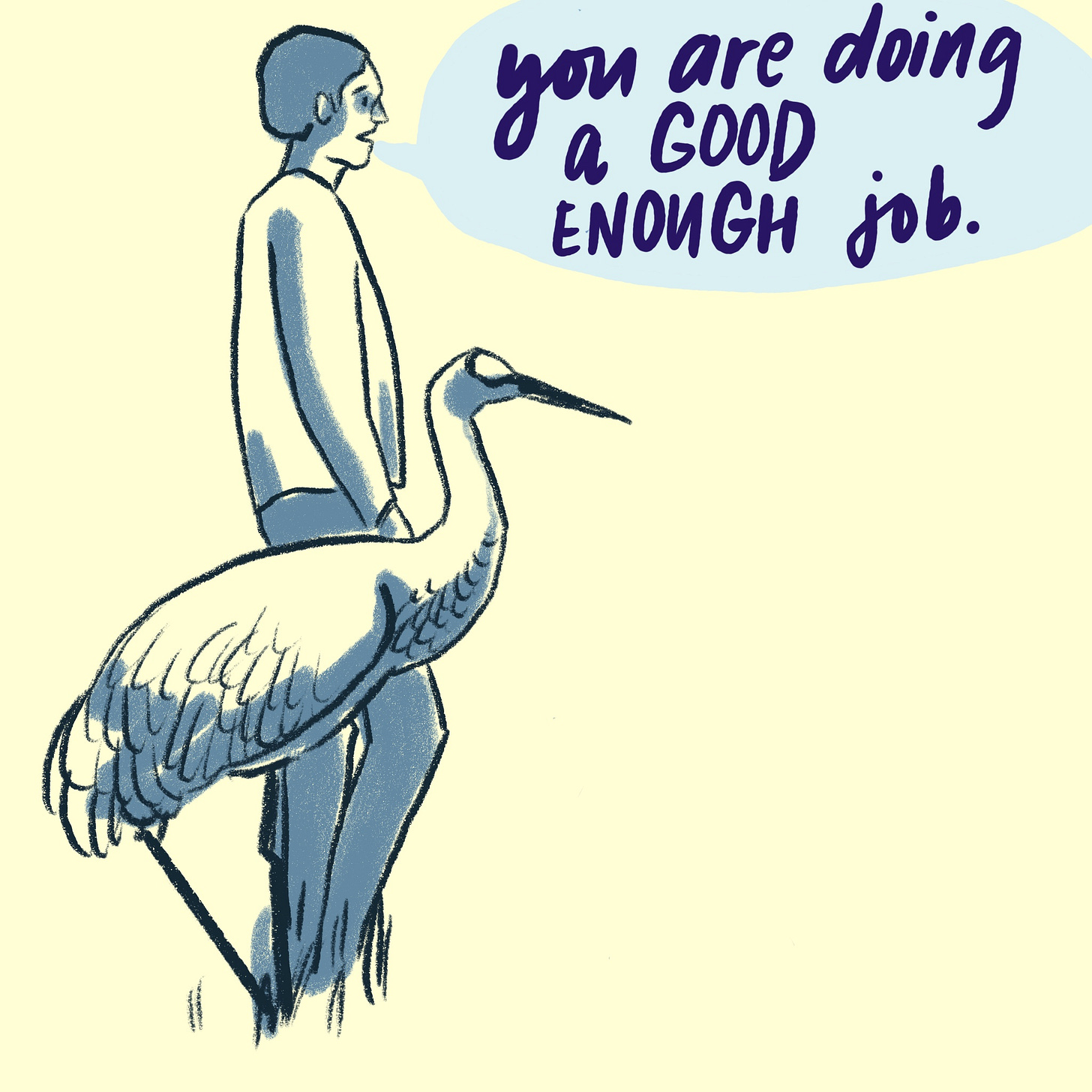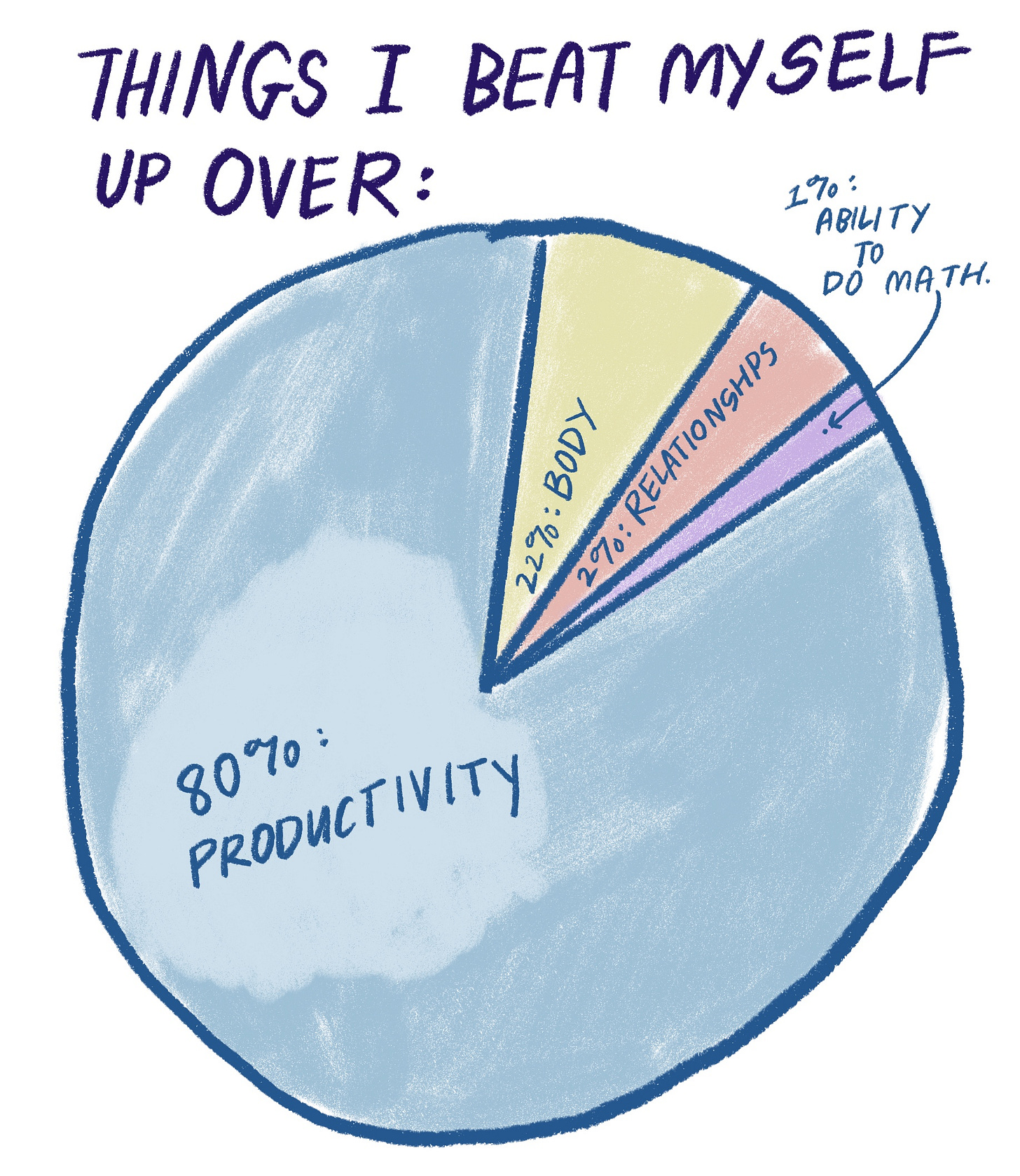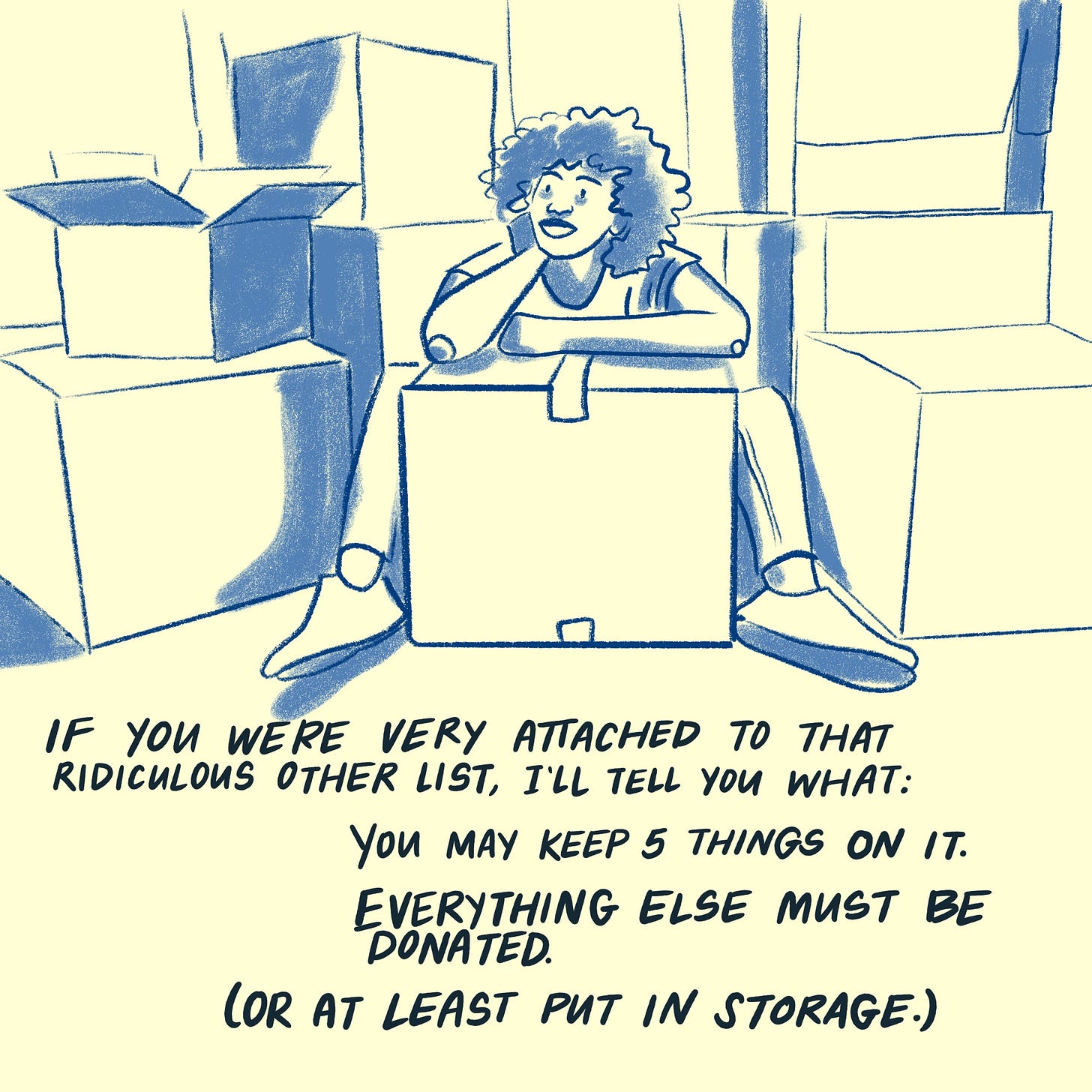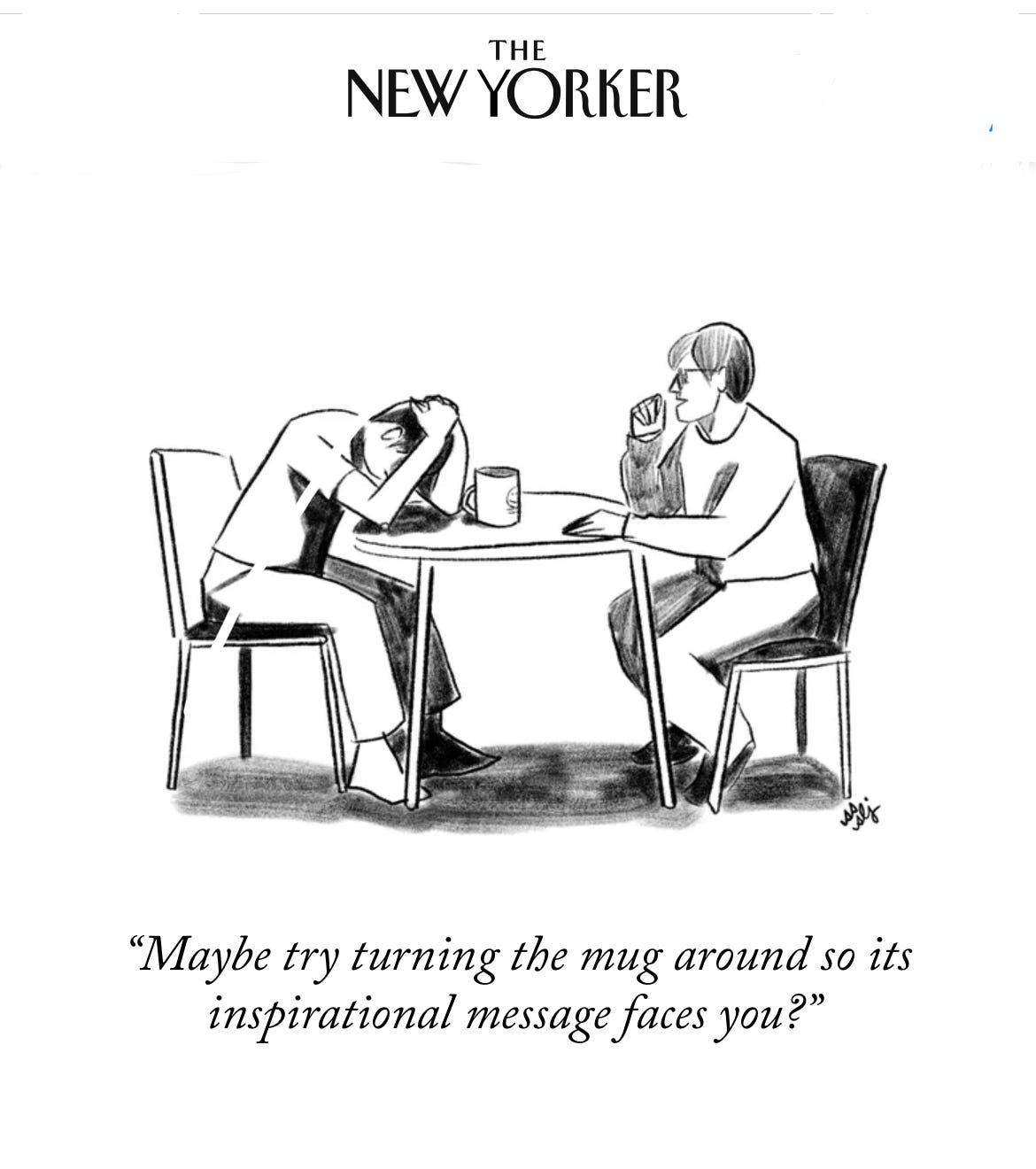You Can Do 5 Things
And also, I respond to a difficult comment on an Instagram thing I posted!
A note for you, if you’re having a tough day
Dear Friend,
In these letters, you and I often talk about productivity. I mean, the subtitle for this newsletter is, “A newsletter for people who beat themselves up.” When you beat yourself up, what is it usually about? Here’s the breakdown for me (which may be different for you):
“Productivity” encapsulates a lot of things. Am I meeting my self-imposed creative deadlines? Am I eating “correctly”? Am I making sufficient time for my friends? Am I keeping up with my habits? The world is falling apart, and what am I doing about that, and is it enough? Am I doing my job as well as I promised I would when I interviewed for it? Is my writing growing at an adequate pace? Am I spending my time in ways that I feel good about? Am I producing enough content? Invariably, my brain responds to all these questions one of two ways: “NO,” and, “NO, YOU HORRIBLE PIECE OF SHIT.” It then comes up with a version of the following admonishment: “You know the things you need to do to be happy. SO WHY AREN’T YOU JUST DOING THEM!?” And then the beating-up-of-self begins.
I write about four things, mostly: relationships, emotions, birds, and not-beating-oneself-up-over-one’s-productivity. My Instagram posts about this latter topic are always the most popular. And so, it feels important that I mention that I know for sure that if you’re feeling bad about what you’re doing, you’re SO not alone.
This is an unusual move for, but I want to talk about two things related to recent Instagram posts I put up. The first one is a response to someone who decided to sound off in the comments. The second is a kind of expansion. Let’s dive in.
The comment was sort of a double comment, on this post:
There are a few dissenting comments on this post, which is fine. Dissent is important. We don’t all need to agree about enough stuff getting done. (Nor do we need to agree about other things.) But here is the one I want to speak more to:
I’d missed the comment initially, which is why I hadn’t responded to it; but I’ve thought a lot about this because the second commenter got so mad.
As with so many things that should be basic human rights, rest ends up too often being a privilege. For people who live below the poverty line, missing a deadline or coming late to work or sleeping enough are not choices, but questions of survival. I think about this a lot now that I have a baby whose (relatively inexpensive) daycare costs at least $1600 a month. You have to send your baby to daycare if you want to make money to buy food and pay for shelter for your baby. But the monthly cost of daycare alone is more than a minimum wage income. The corners that have to be cut are, in a word, impossible. This is why we talk with such seriousness about capitalist systems of oppression (slide 9 in that Instagram post). These are the systems that allow us — and even force us — to put our heads down and keep on working on our own stuff when we know that other human beings are living through unimaginable suffering, every day. It shouldn’t have to be like this: there are enough resources for everyone to have what they need. The idea of scarcity of basic resources is false, but it’s an important tool for people who are in power. adrienne maree brown and others have written powerfully about this, and I recommend reading their writing if you’re curious do go deeper here.
Sometimes rest is a privilege that you will feel you truly can’t afford, and you might be right. That doesn’t mean you haven’t done enough. It means that what was being asked of you was unrealistic to begin with. I’m not trying to convince you that the consequences of not meeting a deadline aren’t real; but I AM hoping to convince you that those consequences ARE NOT YOUR FAULT. Surviving is enough. Carrying around the idea that you have failed because of some personal inadequacy isn’t going to make you do better in the future; it’s going to weigh you down and lurk around and keep you from sleeping when your body needs to sleep. At the end of the day (which will come no matter how desperately you will time to stop), you did enough stuff. The amount you did was enough. Not necessarily enough to please your boss, but enough for you to feel good about waking up tomorrow and facing the day again.
Understanding that rest — which should be a human right — is, unfortunately, a privilege might allow you to notice when you can make space for it, and take it with gratitude. Notice when you are able to rest, and imagine you are being handed a bowl of nourishing, vitamin-rich food that tastes delicious. It would be such a shame to waste something so beautiful. Enjoy it, be fed by it, and use your understanding of its richness to help you fight to make sure everyone else can have some too.
*
Here’s the Instagram post I’d like to expand upon:
I have been using the mantra, “You may keep five things” for several months now. My to-do list (or, my list of things that have to be written down somewhere) is ridiculous. For most of my life, I believed that having this list would help me get things done more efficiently. Instead, calling it my “to-do” list crushed me. It felt like every day I was sitting down to play a video game that was humanly impossible to win. As the day would wear on, it would become clearer that the GAME OVER screen was imminent, and knowing that the loss was coming would make me feel reliably downtrodden by 2 p.m.
When T started going to daycare, I was suddenly given open-ended structure that my life had never before really known. My baby would be gone from 9 a.m. to 5 p.m., which meant that I had a large, specific window in which I could do whatever I wanted to do. This window was a terrific gift, because its comparative narrowness (when unstructured time before been expansive and seemingly limitless) made it clear to me that my gigantic list couldn’t fit inside. I thought, “I can probably do ten things in this window.” But I decided to start with five.
On the first day, I wrote down five things I wanted to make sure I would do that day, deciding that after those things got done, I’d tackle more things on my list. But it turned out that those eight hours were exactly the right length of time to get done ONLY those five things. ONLY those five things, plus eating lunch and taking a walk, which made the quality of the five things much better.
Since then, I’ve tried adding a sixth thing, but six things feels rushed and crunched. The anecdotal data is clear: In one work day, I can do five things. This is shocking. I thought I could do so many more! But the resignation that the true number of accomplishable things in one day might be five has been totally freeing. It’s meant that I can be more realistic with people about my limits and boundaries, and I set more accurate deadlines for myself, which I’m able to articulate to others more clearly.
Now that school is in session, I have full-time work four times a week. On those days, I can only do my job, and that’s all. On Thursdays, I have that eight-hour window of unstructured time, and I can still only manage five things. The clarity around my limits means that I am saying no more. I love this about myself. I feel proud. People like me less, but I care less. I am just one human! My old list was not a human list.
Knowing that I can only get five things done has another positive consequence: I prioritize things that used to get constantly pushed down the list. Every Thursday, I spend 90 minutes working on a book that I’d put off starting for months, because there was never time. Now I can see that there never WILL be time. The book is important to me, so it is a priority. I tend to vary my five-things list: I include one household chore, two pieces of client work, one thing for school, and one thing that feeds my being (like working on my book, or painting a pygmy nuthatch). That’s it! That’s five whole things. It’s not that many things. But on the other hand, doing five things means I’m going to do five things well, and joyfully, and it’s much better than it used to be.
This might be helpful to you and it might not. I have been liberated lately by the idea of doing less. When we discuss simplifying, we often talk about HAVING less, or MAKING DUE WITH less, which can be noble goals, but paradoxically require us to do more. Having less means going through all your stuff and getting rid of it; sorting it, donating it, deciding you can part with it, etc. Making due with less often requires planning and goal-setting and taking inventory. DOING less is about letting yourself off the hook sometimes, and understanding that sometimes making the most out of life requires letting some of life go.
Love,
Sophie
Parenting Paragraph
Saturday is T’s first birthday. I am holding a lot of thoughts and feelings about this; many of them are metaphysical and they come out in my dreams. The main thing I’m feeling is that it’s been a wonderful year. It’s been soft and restful and interesting and wild. My skin all looks different — droopier, like the skin of an adult; a person who couldn’t possibly be mistaken for a child. My body feels different, and in part, I’m still mourning — the parts where there is no going back, and I didn’t realize how no-going-back-y it was going to be. There are parts I’m grateful about — like, I haven’t had a panic attack in one calendar year, and that is probably the first time I have been able to honestly say that since I can remember. Things have simmered, and I feel restful. The year was longer than most years of my adulthood, and the thing about everything changing so fast is certainly true, too. Anyway, T dressed up like a flower for Halloween, and boy, was that cute. I generally don’t post pictures of Baby T on the public internet, but I can’t resist this one:
This Week In Sophie
Sammi and I have a cartoon in this week’s New Yorker! Here it is.
If this newsletter is valuable to you, please consider joining a paid tier! AND, if this newsletter is valuable to you and you want the fun bonus content that comes with the paid tier (like a Monday thread, extras on Friday, and a book club), but can’t afford to give anything financially right now, let me know and I’ll add you. Sometimes things are tight, and I appreciate your emotional presence as well.

















This was such a helpful post. I recently bought post-its of various colors (one color per category of "to-do" like my farm business, writing, house work, etc.). Those column of tasks live on a wall, and every few days I pull a few to stick to a little board that has three columns: TODAY, TOMORROW, and DAY AFTER TOMORROW. I plan in three-day cycles like this. But I often end up having to push things to the next day because I rarely finish what I stuck on today. So now I'll try to cap it to five and see what happens.
Today is one of those days where I really needed to hear all of this.
Hell, THIS WEEK is one of those weeks.
Time to build rest into my schedule.
Thank you for everything you do, Sophie! 🙌🏼